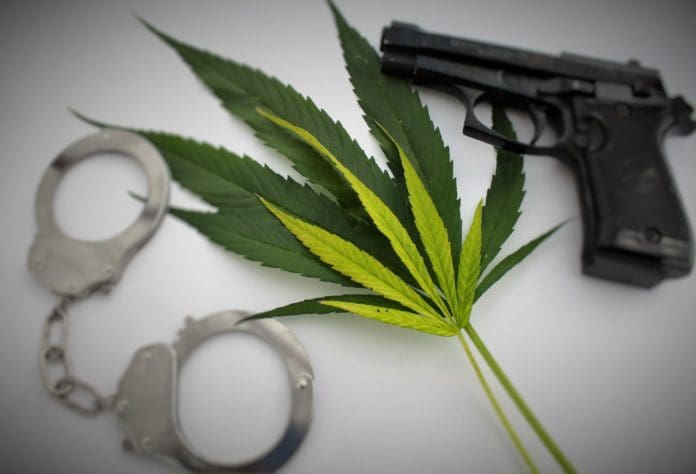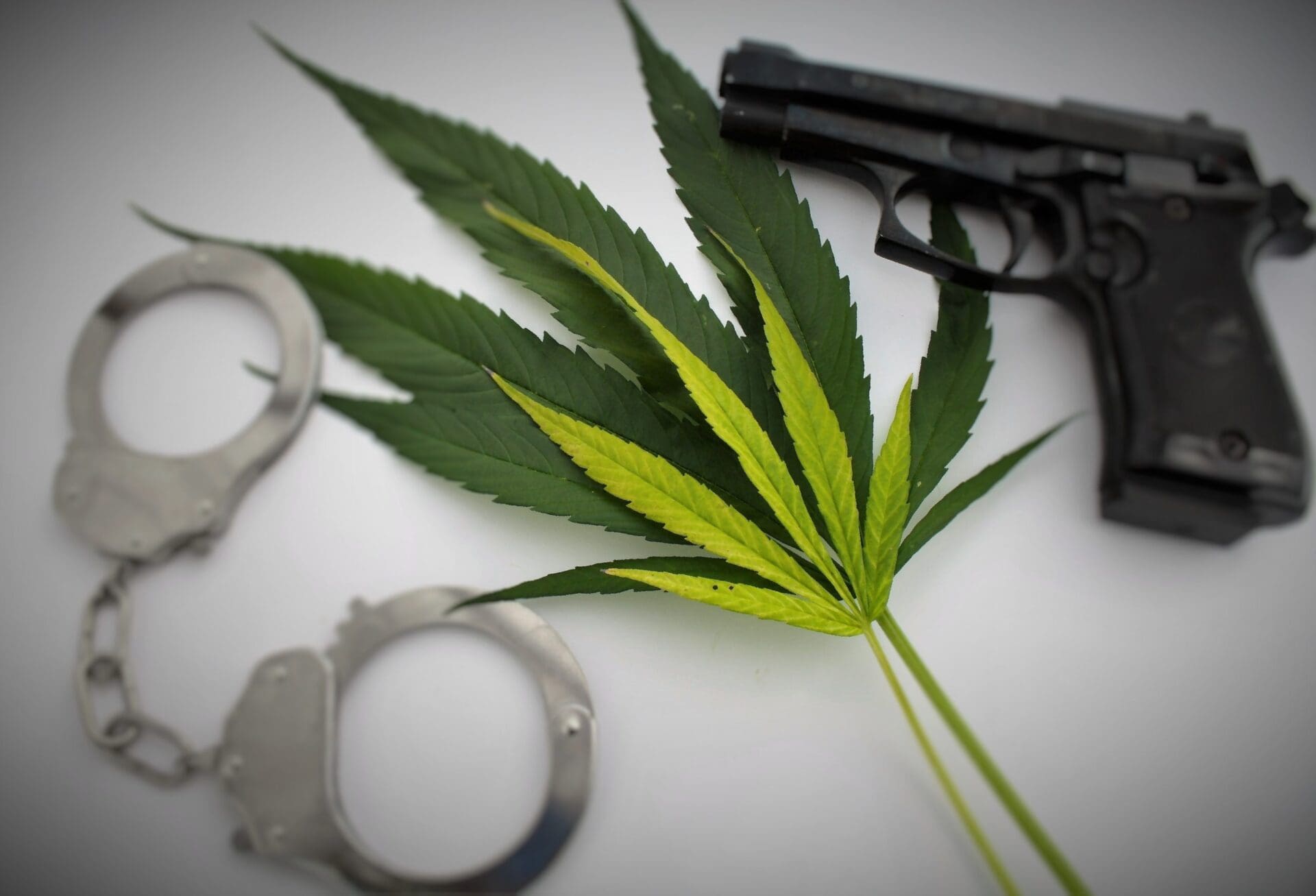
As more states increasingly legalize the recreational use of marijuana—24 states according to CBS News currently do—the move has put gun owners who like to toke and can legally do so according to their state’s permittance into a legal conundrum when purchasing a firearm: How to honestly answer question 21(f) on ATF Form 4473 without committing perjury and leave the store with their firearm? The answer is, they can’t.
The question asks, “Are you an unlawful user of, or addicted to, marijuana or any depressant, stimulant, narcotic drug, or any other controlled substance?” Upon that reading, many pot-smoking gun owners who think they’ve watched enough courtroom movies to make them an armchair lawyer would think the “unlawful” terminology gives them a loophole.
“Hey man, I “legally” smoke it so I’m good,” some have argued.
Sorry to harsh your mellow, but that argument will only land you in legal jeopardy since smoking marijuana is still banned under federal law and that is all the ATF cares about on the Firearms Transaction Record Form 4473. In fact, to avoid this confusion for people completing the form, the ATF added the following warning immediately below question 21(f) on January, 16, 2017, “Warning: The use or possession of marijuana remains unlawful under Federal law regardless of whether it has been legalized or decriminalized for medicinal or recreational purposes in the state where you.”
In fact, as far back as 2011, the “ATF issued an Open Letter stating ‘any person who uses or is addicted to marijuana, regardless of whether his or her State has passed legislation authorizing marijuana use for medicinal purposes, is an unlawful user of or addicted to a controlled substance, and is prohibited by Federal law from possessing firearms or ammunition,’” the Federalist Society reports. Note, it does not just bar you from buying a gun, it actually bans the possession of firearms and ammunition, meaning many firearms owners, like Hunter Biden, are technically already in violation of federal law and could be subject to fines and prison if the government ever wanted to come after them.
With the recent Supreme Court decision in United States v. Rahimi, in which the court upheld the right of the government to disarm persons who pose a threat to others (Texas resident Zackey Rahimi was subject to a domestic violence restraining order and under law, barred from possessing firearms), the DOJ has doubled down on what that ruling means for marijuana users in a separate case. In a recent court filing, the DOJ submitted a brief with the 11th U.S. Circuit Court of Appeals stating their position is “medical marijuana patients who possess firearms ‘endanger public safety,’ ‘pose a greater risk of suicide’ and are more likely to commit crimes ‘to fund their drug habit,’” according to Marijuana Moment. The website is basically a TTAG for pot smokers.
“This is the latest development in the two-year case, with a group of Florida medical cannabis patients arguing that their Second Amendment rights are being violated because they cannot lawfully buy firearms so long as they are using cannabis as medicine, despite acting in compliance with state law,” the Marijuana Momentreports.
So, the battle over guns and pot use has just heated up for those trying to see through the legal haze like two bums scrapping in an alley over a blunt of chronic. Here’s what you need to know:
Federal vs. State Laws on Marijuana and Gun Ownership
The crux of the issue lies in the conflict between state and federal laws. Despite the legalization of marijuana for recreational or medical use in states like Nevada and Florida, federal law still classifies marijuana as an illegal substance. According to The Nevada Independent, the DOJ argues that marijuana users pose a threat to public safety, claiming that their drug habits increase the likelihood of committing crimes to fund their addiction. This rationale is used to justify barring marijuana users from gun ownership, even though this argument mirrors outdated anti-drug rhetoric from decades past.
Recent Supreme Court Decisions and Their Impact
The U.S. Supreme Court’s rulings have played a pivotal role in shaping the legal landscape surrounding this issue. As noted in the case of United States v. Rahimi, the Supreme Court upheld a federal ban on gun possession by individuals under domestic violence restraining orders. The decision emphasized that the government has the authority to disarm individuals who pose a credible threat to others, as reported by News 6 Orlando. However, this ruling has broader implications, as it suggests that the government can restrict gun rights based on perceived threats, a principle that the DOJ extends to marijuana users.
In the wake of Rahimi, the Supreme Court vacated a decision by the Fifth Circuit in United States v. Daniels, which had ruled that the federal prohibition on gun ownership by marijuana users was unconstitutional. This move indicates the Court’s willingness to reconsider restrictions on gun possession by individuals who use federally illegal drugs, even if those substances are legal under state law. As noted, according to CBS News, 24 states currently allow for recreational use of typically small amounts of marijuana, while a medical use of marijuana is legal in an additional 13 states as well as all of the states where recreational use is permitted. Only 13 states align with federal law in the outright banning of any marijuana use and in four of those—Idaho, Kansas, South Carolina and Wyoming—marijuana as well as all cannabis products, such as CBD, is illegal.
Legal Challenges and Ongoing Debates
Marijuana users and advocates have not remained silent. In Florida, medical marijuana patients filed a lawsuit challenging federal restrictions that prevent them from owning firearms. The plaintiffs argue that these restrictions force them to choose between their state-sanctioned medical treatment and their Second Amendment rights. They contend that there is no historical precedent for disarming individuals who use intoxicating substances without evidence of violent behavior, as noted by Green Market Report.
Former Florida Agriculture Commissioner Nikki Fried, who initially filed the lawsuit, emphasized that the federal prohibitions unfairly target law-abiding citizens who use marijuana for legitimate medical reasons. The case, now before the 11th U.S. Circuit Court of Appeals, has drawn attention to the broader issue of reconciling state and federal laws on marijuana use and gun rights.
Government’s Position and Public Safety Concerns
The DOJ maintains that disarming marijuana users is a necessary measure to ensure public safety. They argue that regular drug users are prone to misuse firearms due to drug-induced impairments in cognitive function and judgment. Moreover, they claim that drug users might commit crimes to sustain their habits, posing a danger to society. This argument, however, has been met with skepticism. Critics argue that such blanket assumptions about marijuana users are not only outdated but also lack substantial evidence. A number of pro-use groups have also filed briefs in the case, according to Green Market Report. At the same time, there are plenty of gun owners opposed to marijuana use as well, so even within the firearms community, there is some disagreement on the matter.
The Future of Gun Rights for Marijuana Users
As the legal battles continue, the outcome of these cases could have significant implications for gun rights and marijuana laws across the United States. Even as some states begin to step back from broader legalization or observe issues related to legalization, i.e., traffic deaths in Colorado related to marijuana-impairment have more than doubled, suicides in which the person had some cannaboid in their bloodstream have more than doubled in Colorado, marijuana-related hospitalizations have increased and some have suggested whether it has led to a higher homeless population in the Mile High state responses in a survey of inmates in 2018. Colorado has served as a sociological and legal test case in marijuana legalization as it was the first state to decriminalize marijuana for recreational use in 2014.
Since that time, the intersection of federal and state regulations has created a complex legal environment that requires careful navigation by lawmakers, courts and for right now, a percentage of gun owners.
Advocates for marijuana argue for a more nuanced approach that considers individual behavior and actual risk rather than broad categorizations based on drug use alone. Meanwhile, as the case in the Eleventh Circuit works its way through the system, pot smokers are holding their collective breaths like someone who just took a big bong hit and hoping a final resolution of this case will clear the haze in determining whether they can ever fully exercise their Second Amendment rights without fear of federal prosecution.
Read full article here


